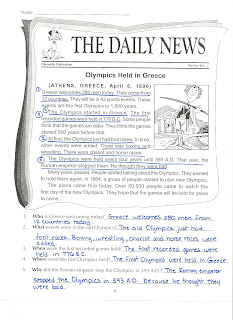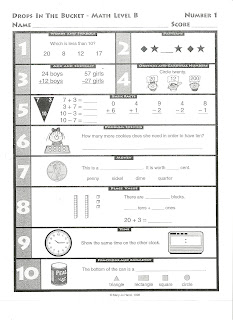I wanted to attempt to answer families' questions regarding homework and to provide you a reference to refer to throughout the year. I will discuss homework at the Parent Information Night as well.
Homework has changed significantly over the years, both in purpose and amount. I strongly support the research based recommendations of 3rd graders having regular homework to primarily develop positive time management and work habits, rather than to learn new material (which will become the focus in later years). (Students doing additional or individualized homework for intervention and support will be learning new skills.) I also support the recommendations of approximately 10 minutes of homework per grade level. However, as the school year begins and students return from summer, homework can take considerably longer than this until they get back into the swing of things or develop imporant skills. Seeing this through, as hard as it can be, is important for students' success and will make future homework much easier for them.

I do not grade homework as it is often not done independently, but I do check to ensure it has been attempted and do communicate with families if it is not turned in regularly or if it is not done correctly. I will attempt to email you to let you know your student has not returned their homework. However, our days are full and I may not get to this task every day.
Homework habits are important to your student's success as well. Most research (and parents) find their students are more successful when they have clear, predictable, and routine homework habits. This can be hard these days as many of our children are very busy with additional activities such as sports and social organizations after school. I recommend:
- Consistent routine: Your student may do better to come straight home and finish their homework, or they may need a break and a snack. You know your student best. The goal is to aim for consistency.
- Place: Your student will do best with few distractions (e.g., away from electronics, pets, and siblings) in a quiet environment. You may even plan to take them to the library after school to do their homework.
- Time management: Your student should develop a sense of how they spend their time when they are "working." My own two students are vastly different. One will knock out their homework with concentrated effort in ten to twenty minutes. The other had to overcome a habit of balking at their work longer than the actual work took. I simply timed their on and off task work and shared it with them once they were done. This can be difficult. I know from personal experience. There are no magic short cuts. My only advice is to stick to it and feel free to involve me in discussions with your student to reinforce that this is work I've assigned and its purpose. This can help alleviate any homework fights you may endure.
- Independence: I will explicitly model my homework expectations and strategies and expect your student to attempt it on their own. Let them try before you jump in to help or they may become dependent. However, if your student is struggling, please let me know and I can make modifications.
Nightly Homework - What To Expect
Students will receive homework Monday through Thursday. I do not assign weekend homework. Homework is always due the following day. I find it is easier for students and families to manage nightly homework than packets, which can get pushed till the end of the week for a long night of homework, which defeats the purpose of developing good work habits and time management.
Word Study: Once the school year has gotten under way, your student will be assigned specific spelling words (and more importantly, patterns) to practice nightly. We will not start spelling for the first few weeks of school as I will be assessing students developmental spelling levels during this time to determine their needs. I will share specific strategies to help your student practice these patterns in the blog. Here are several choices to help your student stay interested, as well as utilizing multiple methods of accessing the same learning.
- See it, say it, spell it (three times for each word ensuring practicing correct spelling)
- Sort by pattern
- Write additional words with the same patterns
- Write the words in alphabetical order
- Count syllables
- Use words in sentences
- Word ladders
- Identify parts of speech, often multiple
- Practice lists of words: colors, days of the week, months, holidays, states, countries, etc.
- Keep a list of words you miss to practice
- Family spelling bee
- Research word origins
- Have fun with palindromes (e.g., never odd or even)
Reading: I love to read! I read fiction and non-fiction, from biographies and books on physics (I don't always understand them) to fantasy and science fiction. I will try to share my love of reading for pleasure, but my homework focus will be on reading for information, the primary reading activity your student will have as they continue through their education. Your student will receive a one page reading and response passage, The Daily News, nightly. I've provided a sample below to show you what these look like and how I expect them to be completed (although I suggest pencil). The backside includes a student-parent checklist that is intended to empower the student to check their own work before you ever see it. This checklist demands a great deal at the beginning of the year but nightly practice should make it second nature over time, with the goal that these become generalized habits for reading and writing. I will update which checklist skills we cover at school in the blog so you know which ones your student is responsble for. The first week's homework goal is simply to get students into a routine and I will accept most homework regardless of the skills demonstrated.
Nightly Reading Homework Sample
Parent - Student Reading Homework Checklist
Please note that checklists are much easier if students focus on a single task (e.g., capitals) for all of the sentences, rather than trying to check for multiple tasks (e.g., capitals and punctuation) at the same time. Please sign off on your student's reading homework checklist.
I will work hard to identify students' reading levels as quickly as possible, but will start the year assigning everyone the same homework.
Math: Math instruction has probably changed more than any other academic area since most of us were in school. Where we learned algorithms and memorized linear math, today's students are taught to truly understand math and problem solve using a variety of possible strategies to arrive at a single common answer. Your student's math homework will review common linear concepts and support fact fluency. Your student's familiarity with these more basic concepts will support their ability to do far more complex math at school. The front of their homework will be a Drop In The Bucket review sheet (see below).
Nightly Math Homework Sample
The back of their math homework will be a series of addition (later multiplication) facts based on strategies. These strategies, which I will share explicitly on the blog as I introduce them, will be your student's anchor to recalling or quickly solving these facts. It provides them with a way of organizing facts into groups (e.g., spelling patterns) without having to memorize 100 seemingly independent math operations.
Nightly Math Fact Fluency Sample
I will discuss mutli digit operations at our Parent Information Night. Please hold off on teaching your student traditional algorithms until we've had a chance to discuss these.
Keyboarding: Keyboarding is becoming an indispensable skill for all students, especially for those with fine motor challenges. Future assessments will be taken solely on computers, even for 3rd graders and their ability to concentrate on their work, rather than hunt and peck on a keyboard, will make a significant difference in how they perform. Our 3rd grade team is working hard to collaborate on ways to provide frequent and consistent keyboard practice. However, with so little time in the day, your student will greatly benefit from five to ten minutes of keyboard practice at home. I will share how they can download great free software to use at home at our upcoming Parent Information Night.
Challenge Homework
Many families request additional or "challenge" homework for their students. Here are some suggestions for families who desire more, and more importantly, differentiated work.
Reading for enjoyment with your student develops a joy for reading as well as showing them you value reading. Students can respond to their reading by journaling or discussing. There are no limitations. A former student used to make Lego movies of his favorite scenes from books. Students who struggle with reading may enjoy reading harder texts along with a book on CD. Our Windermere library and all of the Upper Arlington library branches will be happy to help you match books with CDs.
Your student can click on their name and they will be redirected to their home page. Please explore this page with your student to learn more about the many options they have. The page will offer at-level texts specifically chosen for your reader's needs. I have made initial assignments based on your student's end of year Developmental Reading Assessment (DRA) score. (If I do not have DRA scores I assigned your student a level 28, on grade level end of 2nd grade.) It also offers assessments and even a reader so your student can listen and follow along. There are fiction and non-fiction texts, as well as core curriculum science and social studies links as well. It's a great resource. Many students have had direct experience with this site at school. No alignment is perfect and some students may have a too easy or too challenging text level. Please let me know if the text is too difficult. I will be able to adjust and monitor student progress. I would recommend reading one story per night on school nights. I am very comfortable assigning your student additional reading if this makes this otherwise optional homework less of a fight for you at home.
Math: Students can always practice math facts to develop proficiency, but you may want to focus on problem solving, simply starting with creating your own story problems. I advocate using the
part + part = whole
model where students have to first identify the missing addend or factor before solving the problem. Construction projects and science experiments provide great opportunities for utilizing math in meaningful ways. I will share websites you may want to visit at our Parent Information Night.
Ohio Department of Education: Families that want to get a better idea of the types of testing their student will experience this year can visit the ODE's website and view previously administered 3rd grade reading and math assessments.
http://education.ohio.gov/GD/Templates/Pages/ODE/ODEDetail.aspx?page=3&TopicRelationID=240&ContentID=4348&Content=126215
Sick & Vacation Homework
I do not assign homework for students who are ill or take planned absences during the school year. If a child is ill I want them to rest, recover and rejoin us as soon as possible. For those who are travelling, I do encourage them to read for enjoyment, practice math facts and journal about their adventures. I do not hold them responsible for missed homework.
















